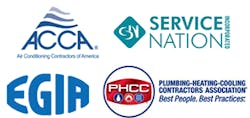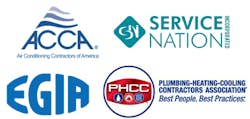9 Groups You Must Join to Survive in 2023
Business is built on relationships and relationships are built in groups. Membership in groups helps you network with people who can steer business you way, can help you avoid mistakes, save time, and defend your interests. Here are nine groups you must join in 2023.
Contractors are independent by nature. It goes with the territory. You may start by helping a senior tech, but eventually you are given your own set of keys and work largely on your own, going from distressed customer to distressed customer. Independence and a solitary approach become comfortable. When you hang out your own shingle, it feels wrong to seek out ways to associate with other contractors. Can you trust them? What’s in it for them? What’s in it for me?
As noted above, a lot is in it for you. The most successful and fastest growth contractors are those who belong to groups. Here are nine.
1. Your Local Trade Association
Local trade associations can be invaluable to contractors, but there’s a catch. You have to make the time to attend the meetings. The association itself seeks to have good programs and provide great information, but the networking with contractors is what makes these meetings stand apart.
It is good to get to know the other contractors in town on a personal basis. Some you may not like. Some you may distrust. But, there are some you will both like and trust. Even when you do not like someone, it is valuable to have enough of an acquaintance to be able to call the contractor up to talk about a potential problem or an opportunity between your companies.
It is valuable to have enough of an acquaintance to be able to call the contractor up to talk about a potential problem or an opportunity between your companies.
The local associations provide an incredibly valuable role in keeping you apprised about local market conditions. Sure, you know what you see and feel, but the association meetings will give you a sense of what others are sensing. It can be an early warning signal or early opportunity signal.
2. Your State Association
When state and local associations exist apart from each other, they are usually fairly well connected. The state group provides a good clearinghouse about what’s coming down the pike from the state capitol. They are also the only vehicle you likely have to influence state government one way or the other. At the state level, a group of contractors can provide a viable defense against really stupid legislation.
When state and local associations exist apart from each other, they are usually fairly well connected.
3. A National Trade Association
National associations play a similar role in lobbying the national government. Every contractor should help the national associations lobby. It starts with lobbying the association executives about what’s really important to you, in the field.
National associations also play a key role in setting standards. They need contractor involvement in writing and updating the standards. Maybe you are not in a position to help today, but it is something to consider in the future. The standards are going to be set by someone. That someone could be a non-responsive government bureaucrat or it could be an industry association that welcomes contractor input. Which do you imagine is better for your company?
The national associations to consider are ACCA, PHCC, RPA, RSES, and SMACNA. ACCA is focused on residential HVAC. The PHCC leans plumbing, but4. Your Local Chamber of Commerce
Every town has one or more local chambers of commerce. Join one. Heck, join them all. The chamber is in the business of promoting local businesses. Their mixers are great ways to build your network and find other companies you can refer and that can refer you.
5. A Leads Club
An excellent source of lead generation is a leads club. These clubs typically will only allow one HVAC company (or plumber or electrician or whatever) to participate, so you do not have to worry about competitors. The purpose of these clubs is to help each other generate introductions and referrals. If you have a salesperson on staff, membership and attendance in a leads club should be a job requirement.
Many leads clubs are local. You can find them through the local chamber of commerce. There are also national leads clubs with lots of local chapters. These include BNI, Le Tip, and Netweavers.
6. A Local Service Club
Service clubs can also generate business. After all, service clubs tend to be comprised of community centers of influence. Their purpose, of course, is to support the local community through monetary donations from fundraisers and service projects. Typically, service clubs meet over breakfast or lunch, reducing the imposition of time required. If you are going to eat lunch, eat it with community centers of influence who can refer business to you.
The leading service clubs are Civitan, Kiwanis, Lion’s, Optimists, and Rotary. There are also local clubs, such as “salesmanship” clubs. If you won’t join one of these clubs, delegate membership to someone else in your company.
The leading service clubs are Civitan, Kiwanis, Lion’s, Optimists, and Rotary. There are also local clubs, such as “salesmanship” clubs. If you won’t join one of these clubs, delegate membership to someone else in your company.
7. A National Business Association
National business associations supporting business or small business in general is also an effective lobbying force. Because they represent more businesses than trade associations, their voice tends to be louder. While they do not always recognize issues particular to the HVAC industry, they are nevertheless strong voices. The two most people think of are the National Chamber of Commerce and the National Federation of Independent Businesses. Of the two, the latter is more focused on small businesses and Main Street.
8. Specialty Associations
Specialty associations related to a particular profession can also be difference makers. These include the American Management Association, American Marketing Association, and others. There are also specialty associations within the trade. Women in HVACR is a growing and powerful force in the HVAC industry. Key women in your organization should be encouraged to join.
9. Contractor Alliances
Finally, we have contractor business alliances. These are contractors who work together on best practices and mutual support. They require investments, which are returned in spades to the contractors who follow the programs each alliance promotes. While alliances come and go, those with more longevity include the National Comfort Team, Nexstar, the Service Nation Alliance, and Success Group International.
Matt Michel is a member of the Contracting Business Hall of Fame. A serial entrepreneur, he is a speaker, writer, and rancher.
Confused by the business alliances? The first step for many contractors is to start with the Service Roundtable. At $50 a month, it is affordable for any contractor. Get started today at www.ServiceRoundtable.com or call 877.262.3341.
About the Author
Matt Michel
Chief Executive Officer
Matt Michel was a co-founder and CEO of the Service Roundtable (ServiceRoundtable.com). The Service Roundtable is an organization founded to help contractors improve their sales, marketing, operations, and profitability. The Service Nation Alliance is a part of this overall organization. Matt was inducted into the Contracting Business HVAC Hall of Fame in 2015. He is now an author and rancher.

